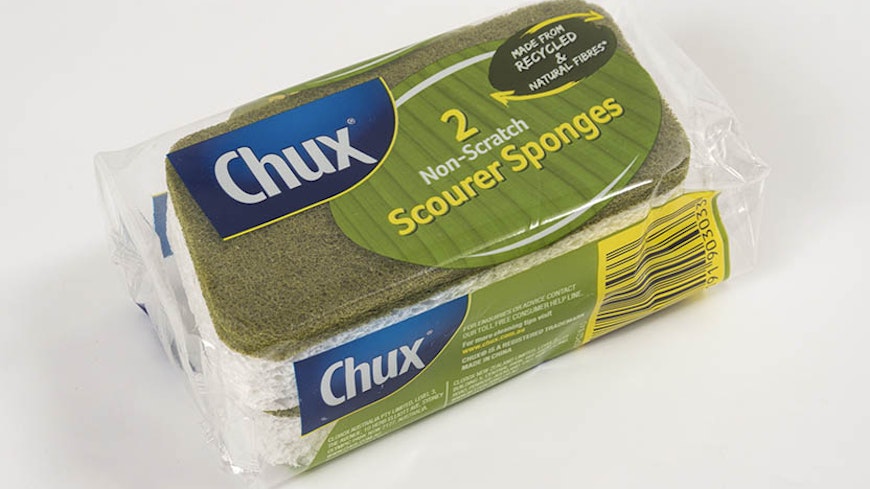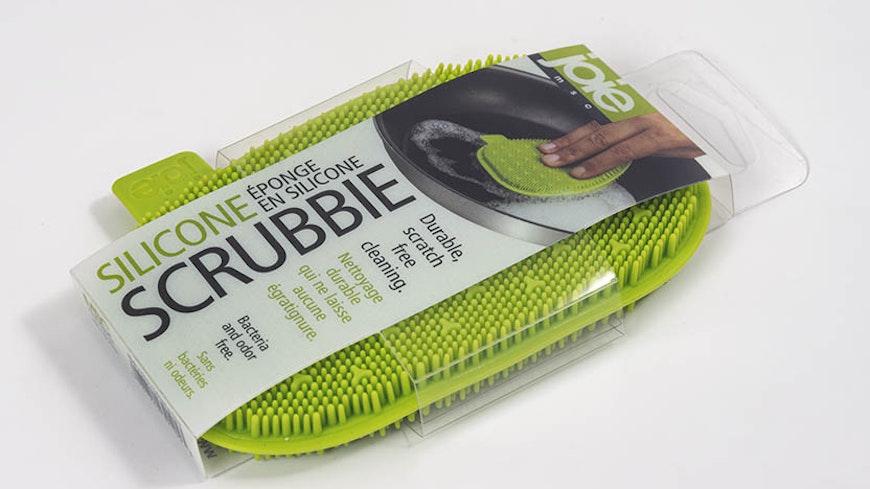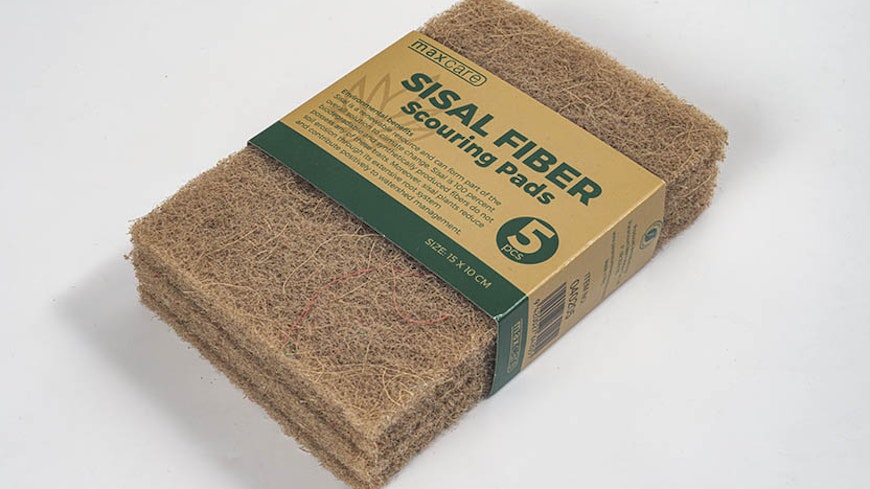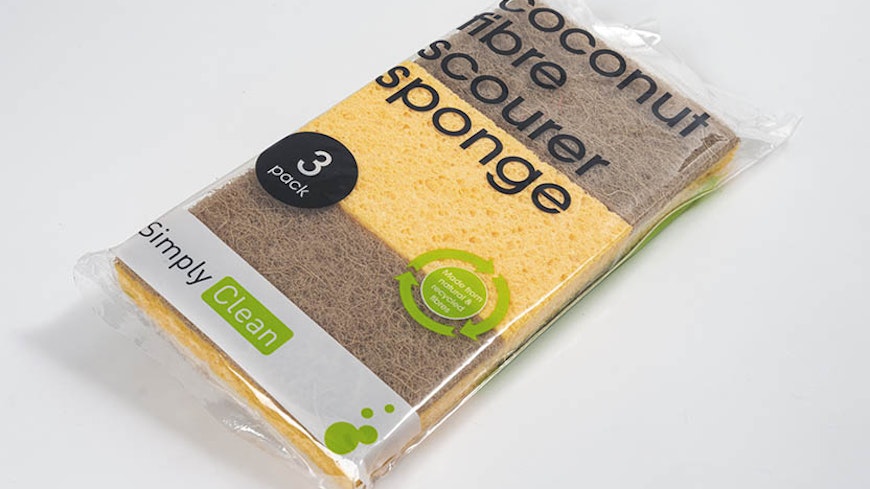Doing the dishes isn’t my idea of fun, but non-stick cookware should always be washed by hand lest the dishwasher’s high temperature and harsh detergent wreak havoc on the fragile surface.
Tip: Never use anything abrasive, including plastic scouring pads, steel wool or stiff brushes, on non-stick cookware.
Many dish sponges and scourers are made of plastic, though. Unfortunately, such products have a short lifespan and will inevitably end up at the tip, so I trialled five “eco” options to see if any were up to scratch.
Chux Sustainable Non-Scratch Scourer Sponges

2 Pack, $5.29 supermarkets
These scourer-sponges are almost indistinguishable from the usual suspects – they look, feel and work as well as their ordinary counterparts. The difference is that the scourer is made from recycled plastic PET bottles, while the sponge is “100% natural fibres” (cellulose). All up, the scourer-sponges contain “35% synthetic abrasive particles, binder and pigment” and “65% natural & recycled fibres”.
That doesn’t sound too bad, but it’s not clear how much of that 65 percent is recycled plastic and how much is from a renewable source such as cellulose. And even though the cellulose is plant-based, it’s been treated with biocides, so the sponges can’t be composted.
Verdict:
They work as well as their ordinary counterparts, but at the end of the day, they're still mostly plastic.
★☆☆☆☆
Joie Impulse Silicone Sponge Scrub

$12.99, Farmers
A key selling point – that this “scrubbie” doesn’t harbour bacteria* – is a mixed blessing. Scrubbies aren’t absorbent, so presumably germs can’t soak in. But that also means detergent just slides right off.
Also, scrubbies lack the pliability of a normal sponge (good luck squeezing it into a narrow-mouthed bottle) and the spiked side didn’t remove stuck-on food. It did, however, do an excellent job on plates and cups and is now my go-to for lightly soiled washing-up.
I’d bought two scrubbies on special, so I took one home, sterilised it, and tried using it to remove dog fur from the backseat of my car. (That’s not weird – the advertising spiel says it “can also be used dry to remove lint and hair”.) Perhaps the scrubbie was having a bad hair day, but my car’s upholstery is still a lot furrier than I’d like.
Although this scrubbie is durable, silicone must be recycled at a specialised recycling facility. I couldn’t find one in New Zealand, so at the end of its life the scrubbie will have to be binned.
*We didn’t test this claim.
Verdict:
One scrubbie will last for years, potentially replacing hundreds of sponges. But it couldn’t shift stuck-on food and can’t be recycled locally.
★★★☆☆
Safix Scrub Pad

$4.50 small, $7.50 large, Commonsense Organics and online stores
Made from coconut fibre (coir) bonded with a “non-toxic, biodegradable adhesive”, Safix Scrub Pads “are suitable for use on most non-stick surfaces”.
Coir feels like fine nylon wire, so I was hesitant to use it on my expensive cookware. Instead, I trialled it on an old, gilt-edged porcelain teacup, where it didn’t take long for the gold to wear down. I then tried a newer, sturdier cup – the metal trim survived 15 minutes of dedicated burnishing. With my confidence growing, I attacked a non-stick pan. Not a scratch!
The packaging describes the pads as compostable (“dispose of in the garden or yard”). The distributor produced certification to support this claim. Specifically, the test result confirmed that “the coir-based scrub pad will not leave any toxic material in the soil”.
If you’re after a natural, hardcore alternative to steel wool, this coir pad is a good option. And as long as you’re careful, it should be fine for all but the most delicate items.
Verdict:
I couldn’t find any negatives.
★★★★★
Maxcare Sisal Scouring Pad 5 Pack

$2, The Warehouse
Like tequila, sisal is made from a species of Agave, a plant native to Mexico. It’s used to make rope, among other things, so I was expecting the Maxcare Sisal Scouring Pads to be at least as stiff and wiry as the coir options. Instead, they were far more flexible. They were also gentler. Even when I put my back into scrubbing a frying pan, the sisal didn’t ruin the fragile non-stick surface.
So far so good, but then I saw a few pink and blue strands. The safety data sheet confirmed the presence of synthetic fibres.
The packaging lists the environmental benefits of sisal and bears an “eco-friendly” icon, so it’s easy to assume the scouring pads don’t pose an environmental risk. But the plastic fibres mean the pads can’t be composted.
Verdict:
Sisal is a renewable resource, but the addition of synthetic fibres means the pads will have to be binned at the end of their life.
★★☆☆☆
Simply Clean Coconut Fibre Sponges 3 Pack

$5.99, Briscoes
These cellulose (wood pulp) sponges are topped with a coir-sisal scourer – an effective and convenient combination, especially as the coir-sisal is finer than that used for the Safix. But the scourers contain synthetic fibres, and vinyl acrylic and ureic resin bind it to the chemically treated sponge. That means the product can’t be composted.
Simply Clean’s packaging and website state that the “Coconut Fibre Scourer Sponge is made from natural and recycled fibres, making it kind to the environment”. That’s not exactly wrong, but it is a bit of a stretch to pitch these sponges as environmentally friendly.
Verdict:
The scourers contain some recycled material and the base materials (coir-sisal and cellulose) are renewable, but the product can’t be composted.
★★☆☆☆
Stay in the know
Keep up-to-date with Consumer's latest news, investigations and product and service reviews, plus join the Consumer panel with invitations to take part in surveys.